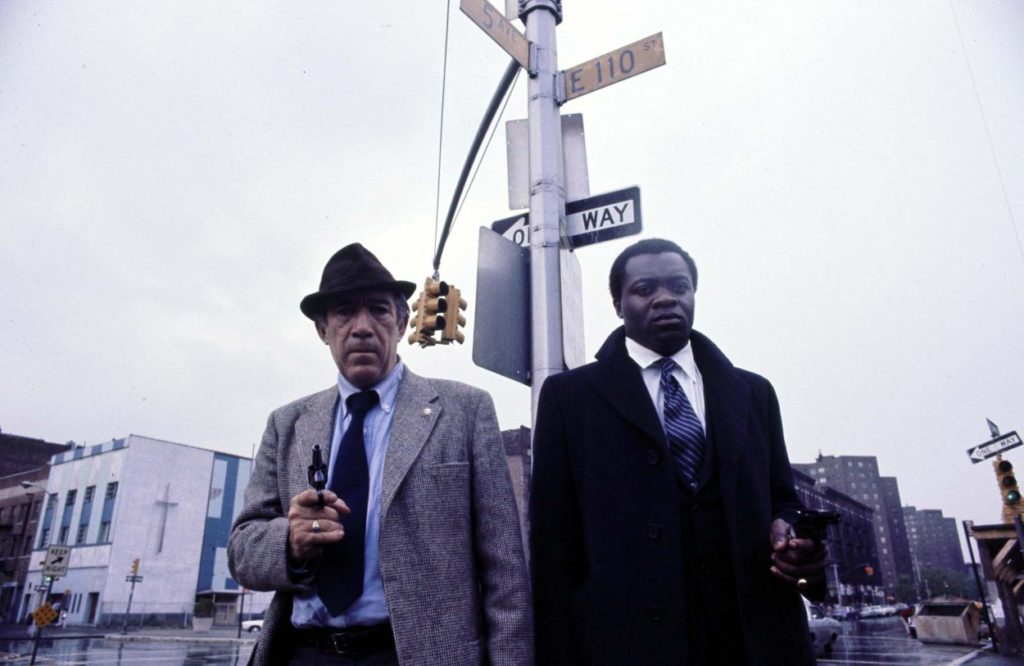Across 110th Street (1972)

One of the grittiest and most violent films of its era, Across 110th Street, is a reliable police action vehicle made especially compelling with its claustrophobic location work, giving us a feel of the bleakness and despair of the crime-ridden streets of the inner city. Asphalt, litter, and graffiti everywhere you look and this film makes no effort to hide any of it, with every room filled wall-to-wall with people and noise. In just under two hours, you’ll almost smell and taste it too, in this very visceral, pull-no-punches look at police corruption and organized crime that permeates the underbelly of our nation’s most populated cities everywhere.
The film starts with a seemingly small-time robbery of some local gangsters by three Black men dressed up as police officers. The heist soon becomes a bloodbath, as the gangsters are killed, and the men get away. The mafia lost a couple of their own in the massacre, and now the local boss is coming to Harlem to exact some justice on the three culprits, although their racist attitudes aren’t exactly winning them any new friends in the predominantly African-American section of the city. Also trying to get to the bottom of the murders is the NYPD, headed by an aging and corrupt white cop named Matteli (Quinn), and an honest, hard-working Black cop named Pope (Kotto). Bloodshed and mayhem fill the streets, making it difficult for this highly charged case to come to an end that isn’t going to be met with violence and escalating racial tensions.
Across 110th Street is sometimes lumped in with the blaxploitation films popular in the early 1970s, but I feel this label is not entirely accurate. While it is a crime-action drama filled with a predominantly African-American cast, the themes are far more of the broader police vehicle type, and not exploitative in the same way that the other films are usually handled. There are no heroes (save perhaps Pope), only victims and perpetrators, with the only message being that those that live by the gun will surely die by the same means. Also, unlike many blaxploitation entries, Across 110th Street isn’t cartoonish — the creators treat the story and characters very seriously, looking to tell a believable crime yarn, and not just trying to make a quick buck on hot-button issues of the day. In other words, it is a ghetto warfare film with more sophisticated ideas, never preaching or pandering; it opens up a world few ever see and slams the door shut once again when it’s all over.
There are also fantastic characters in the mix, with especially strong roles for Anthony Quinn as the cop treading the tightrope between justice and self-serving interests. Yaphet Kotto is especially appealing, in a part that probably had Sidney Poitier in mind, but he is persuasive. Even the bad guys are portrayed as three-dimensional, and even sympathetic, as they wish they could take back their misdeeds, while at the same time, they’re prepared to live with the consequences and enjoy the money.
The violence factor is high, but not any more than many films that have followed. What makes this film’s violence particularly disturbing, happens to be the context. We do get a real feel and sense of the characters, and because of this, we also feel for them when they people get hurt or killed. The violence stays with you, especially when it is cruel, thinking that the characters don’t deserve a fate as bad as they get, while at the same time, paradoxically, it is just desserts.
No, Across 110th Street isn’t a cookie-cutter throwaway blaxploitation flick. It is a thought-provoking, absorbing, and intelligent crime film that commands a viewing for anyone interesting in the subject matter. Unflinching in its violence, its racial epithets, its portrayals of the police, or in its candid exploration of downtrodden urban landscapes, its ability to shock and surprise hasn’t diminished over the years. The visceral impact stays with you long after the two hours you spend with it are over.
Qwipster’s rating: A
MPAA Rated: R for pervasive violence, strong language, nudity, sexuality, and drug use
Running Time: 102 min.
Cast: Anthony Quinn, Yaphet Kotto, Anthony Franciosa, Paul Benjamin, Ed Bernard, Richard Ward, Norma Donaldson, Antonio Fargas, Gilbert Lewis, Burt Young (cameo)
Director: Barry Shear
Screenplay: Luther Davis (based on the book, “Across 110th”, by Wally Ferris)
